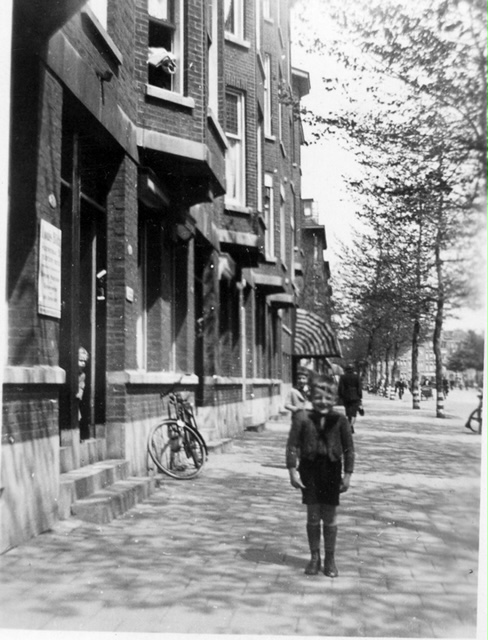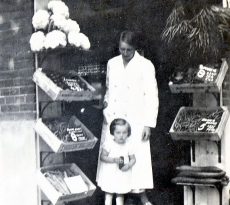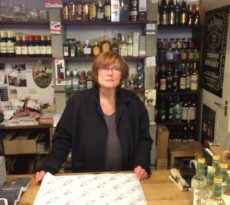In 2020 ontving de redactie een bericht vanuit Calgary, Canada van Johanna Peetoom-Smouters. Zij is in 1934 geboren in de Graaf Florisstraat 23a. Haar vader had daar een groente- en fruitwinkel (“Smouter’s Fruit Blinkt Altijd Uit”). Haar twee jaar jongere broer Willem (Bill), ook hier geboren en naar Ontario, Canada geëmigreerd, blijkt ook erg geïnteresseerd in het nieuws van zijn geboorteplaats, net zoals nog andere zussen en hun kinderen die in Canada geboren zijn. Ze blijken trouwe lezers van de krant.
Sinds die tijd krijg ik regelmatig een berichtje van Johanna die inmiddels richting de 90 jaar gaat. Ze wil graag contact met Eva, de huidige bewoonster van 23a en ze vertelt over de broze gezondheid van haar broer Bill.
In de aanloop van de Eeuweditie van de TelegraafFloris vroeg ik haar wat herinneringen te sturen over de straat in de veertiger jaren, zodat ik die kon verwerken in het artikel Oude Buren, Nieuwe Buren. Daarop ontving ik een langer stuk met haar herinneringen uit die tijd en twee verhalen uit de Tweede Wereld Oorlog van de hand van Bill. Bill heeft deze verhalen gebruikt bij presentatie’s die hij gaf op christelijke scholen op Remembrance Day, de dag waarop de Canadezen hun oorlogsslachtoffers herdenken. Zeer lezenswaardig en relevant voor wie een indruk wil krijgen over het leven in de straat in die tijd.
Toen ik per post de Eeuweditie van de TelegraafFloris naar Canada opstuurde ontving ik het droevige bericht van Johanna dat Bill overleden was.
Hierna volgen de twee verhalen van Bill en daaropvolgend de memoires van Johanna. De teksten zijn in het Engels. Veel leesplezier!
Willem Smouter – “The Wood Stove” (1944)
This is a true story. A story that took place many years ago in Rotterdam in The Netherlands, where I was born and where I lived the first sixteen years of my life.
It was December 1944 – a cold wet winter month. My family at that time consisted of my mother, three sisters and me. We lived behind and above our fruit & vegetable store. To get into our house, you had to come in through the store. We had no back door, and no garden.
There wasn’t much left in the store to sell. The enemy had occupied Holland for 4½ years already and pretty well everything was gone from most stores, with little or no supplies coming in anymore.
I was a very skinny, almost nine-year-old. Two months earlier the enemies had taken my father–and many other men from the neighbourhood–to their country to work for them fixing roads and railway lines. These were often the targets of American, Canadian, and British bomb attacks. We didn’t know whether we’d ever see Dad again. A lot of men had died there.
We used a wood stove for heating the house and for cooking. We had a gas stove in the kitchen, but gas was no longer available. A couple of months before my father was picked up by the enemy, he had been able to buy this wood stove for us. My mother was very happy with it. What Dad didn’t know, however, was that the stove had a crack in it. That crack got bigger as we used it and then, one day, it got so bad that we couldn’t use the stove any more.
My mother was desperate. She wasn’t able to prepare what little food we had and we had no way of warming the house. We prayed a lot in those days, asking the Lord for the most basic things of life, the ones we are now so used to having every day. Mom went on her knees that night, pleading with the Lord for help.
Across the road lived a lady by herself. She had a number of friends among the enemies who lived in barracks down the street from us. Her grown-up son was known to do work for the enemy. Because of that, she wasn’t well liked by her neighbours. Nobody wanted to have anything to do with traitors.
The day after our stove quit working, that lady phoned my Mom. That was strange because she must have known that people avoided her. The lady asked if we had any difficulties in our family. My Mom didn’t know what she meant. The lady said she had had a dream during the night about our family. Apparently she saw us standing around the stove shivering, but we couldn’t seem to get warm. Mom then explained about the broken stove that was now useless.
The lady then told Mom that her son had phoned her from out of town and suggested his mother move in with him. She had agreed and so now she had a stove to spare. If Mom would only arrange to pick it up, we could use it for the rest of the war because she wasn’t planning on coming back to our city until the war was over.
And that is how our family was helped through that terrible winter of 1944/45.
And that is why I think prayers of petition and of gratitude are so important, and why I will always believe in miracles.
* * *
Willem Smouter – “Death on our Doorstep” (1945)
This is a story from World War II. It’s a true story and it happened in Rotterdam, Holland where I was born and where I lived when the Nazis, our enemies, bombarded the city at the outbreak of the war in 1940. Thousands of citizens died and most of the downtown area was destroyed. I was only 4½ years old at the time, but I remember the fires everywhere, fire engines coming and going, sirens screaming all the time, and the smoke hanging over the whole scene.
The enemy occupied our country for five long years. Food was harder and harder to come by. So was the fuel we needed for warmth and cooking. Natural gas was no longer available. People first stripped the wood from the destroyed buildings. Then fences would disappear. Eventually they took whatever might burn in their stoves, including park benches that were chopped up for firewood.
Each year more people died and by 1944 everybody went hungry. City people would take valuables into the country and try to trade them with the farmers for food.
We lived on a corner of a street of row housing, behind our nearly empty fruit & vegetable store. The enemy had taken my father to their country. My mother’s younger sister Susan had come to stay with us to help out in the store and to look after my three sisters and me.
This story took place in January 1945.
Enemy soldiers had taken over a school down the street and converted it into barracks. We therefore saw soldiers every day. Sometimes at night, one or more would come “home” from a party and swagger noisily along our street. They would sing or laugh and could be quite noisy. You would never know what they were up to. Those were scary
situations for my Mom and her sister, with me–the nine-year old, underfed boy–being the only male in the house.
Once, after midnight, we heard a man shouting and rattling the front door of the store. It woke all of us up. We couldn’t make out what the man was shouting, but he was obviously trying to get in. We were scared. “One of those drunken soldiers”, we thought. My mother and Aunt Susan wouldn’t allow candle light for fear that it might give us away to whomever was at the door. My younger sister began to cry. Mom told us to hush and to sit tightly together in a small room at the back of the house. But that didn’t keep us from hearing more noise and more door rattling. Finally everything became quiet. The soldier must have moved along. We went back to bed.
Early the next morning, Aunt Susan went to check the front door. There, outside, she saw a man lying on the ground. She opened the door and ……………was shocked! Instead of a drunken enemy soldier she stood looking at the body of a Dutch railway employee. Probably finding himself near the end of his life, either from illness or from sheer hunger, he had called us for help, but we had misunderstood! What a tragedy!
Mother asked the Lord to forgive us that we had been so scared and not helped a fellow countryman in his greatest need.
When they came to pick up the body, someone touched the small burlap sack the railway man had with him. It moved. Inside was a small, scrawny but live rabbit. His pet? Or perhaps his next meal? We would never know.
Johanna Peetoom Smouter – “Graaf Florisstraat 23, my memories”
The fact that my parents operated a fruit and vegetable store on the corner of the Graafflorisstraat and the Beatrijstraat necessitated that we always be polite when we were spoken to, after all the people could be customers!
The customers were mostly friendly and interested in us. We lived behind the store and people were interested in our lives and curious at the lives lived behind that closed door in the far corner of our store.
Sometimes we were asked questions. My job as a 7 years old was polishing the brass door handle on the store side. Late on a Saturday afternoon, just before closing a friendly woman asked me as I was busy polishing: “Zo, en heeft je moeder je allemaal gewassen en zijn al de nageltjes geknipt?”
I thought it a silly question, but smiled politely.
Next door to us lived a university professor, he and his wife had no children. She talked to my Dad from time to time. She felt lonely because right after supper her husband would go to his study and she would not see him until she brought in a tray with a cup of tea and some biscuits. She said that she was so sick of it that she once opened his study door, stopped and purposely dropped the tray….Her startled husband mended his ways after that. He started with taking his wife for a very fast trip around the block that evening and we often saw them walking from then on.
Quite a few professional people live on the right of us along the street such as lawyers and doctors. One of these doctors, a Urologist had frequent patients sent to him from far and wide. From time to time one would enter the store to ask for directions.
One day a gentleman came in, touching his black cap about to ask for directions. My Dad recognizing the bulge in his jacket pocket with the tell tale sign of a corked bottle said: “Six houses down the street ,Sir”.
My brother and I also turned on the lights on Saturday morning for the Cohens, their religion forbade them to this themselves.
We got a phone call from Mrs. Cohen one lunch hour. The store was closed at lunch but even so, customers come first. “Mr. Smouter, can one of the children bring half a pound of strawberries, please?’
“Well.Mrs. Cohen, the strawberries are very ripe and I am afraid they may get squished”.
“Oh, I don’t think it will be that bad.”
But it was and we got complaints. We continued to be polite. Years later though I reacted angrily to that store bell at lunch. That was when my brother and I took turns waiting on people to give Dad a break at lunch. No matter how disgruntled we felt, with a smile we appeared behind the counter with a : “How may I help you?”
Housewives would come in and ask Dad: “Meneer Smouter, what shall I make for dinner tonight? I’m all out of ideas.”
“Well, Ma’am, what sort of meat are you having?” And they would build the dinner from there.
Quite a few people employed German “dienstmeisjes” and these girls would ask Dad questions about products. One day such a girl asked: “Has du Gein”. And although Dad was familiar with German, this he did not know but he answered: “Meid, ik heb zoveel gijn!” Of course he would regale us with his stories at mealtimes.
On the opposite side of the street and more to the right, Mr. Van Loon had his milkstore, the melkboer. After the war when there were still lots of shortages my Mum sent me to buy an egg. When I asked for one, Mr. Van Loon said: “Meid, hebbi een feesie?”`
Next to the melkboer and to the left, was a private lending Library and on Saturday my brother and I were each given a dime to borrow a book. My choice was one of a series called Billy Bradley and my brother’s choice were books about Winnetoe, stories about Native warriors.
On the corner of the street directly opposite was de winkel van Van der Meer en Schoep, a bakery. On Saturday afternoon I was sent there to buy cookies for Sunday. The cookies were called Kalfsogen. They had a sweet, pink dot in the middle.
My last memory is about something that happened during the war. We had little food and were often hungry. One night a milk tanker truck turned de corner too wide and right on our corner it hit the curb, the tanker part fell over and sprung a huge leak. My Dad gathered up containers in the house and empty bottles from the store and handed them around to the gathering neighbors and all of us caught as much milk as we could. We had a small tub filled to the top, which was put in the empty deep freezer we had in the store.
- Cindy en Olaf op 33b – Nieuwe Buren - 13 juli 2024
- Barhangen bij Midland - 6 april 2024
- Peter’s Kersttip – je uitvaartplaylist - 17 december 2023
Nieuwe Buren – Alberto, Hanneke en kids op GFS 63A Volgend artikel:
Ik vertrek: Hilda Roest























